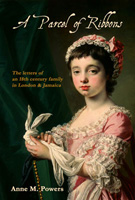British settlers landing at the Cape Colony
There was of course a huge Jamaican diaspora in the second half of the twentieth century. After the second World War the Windrush generation left the Caribbean in large numbers to work in Britain, in the USA and Canada. Many ended up remaining and making new homes rather than returning.
However, there is a sense in which there has always been a Jamaican diaspora, if it is defined as people born in Jamaica leaving for what was perceived as a better life elsewhere.
I was reminded of this when I came across the name Hercules Ross this week. I have written briefly before about the family of Hercules Ross of Rossie, who made his fortune in Jamaica as a merchant and who had two families. Like so many young white men, while in Jamaica he had a stable relationship outside marriage with a mixed race woman, Elizabeth Foord, with whom he had seven children five of whom survived to adulthood.
Ross, who was one of thirteen children of an impoverished excise man, went to Jamaica about 1760 to work as a naval clerk, became owner of a general merchant’s store and two trading sloops, captain of militia, ADC to a Major General, JP for Kingston and was owner of the 200 acre Bushy Park estate. The young Horatio Nelson was nursed back to health from a fever at Bushy Park. During the War with America from 1775 Ross became Prize Agent for Jamaica taking a cut of the prize money for captured vessels, and running his own privateers. He left Jamaica in 1782 and bought the Rossie estate in Scotland in 1785 for £33,250. Like a number of such men he then married. Harriet Parish was the daughter of a wealthy Scots Hamburg merchant and they had four legitimate children.
However he provided well for his three Jamaican sons and two daughters who came to Britain with him. The daughters became school teachers and his sons had positions in the East India Company. Best known was Daniel Ross, who was one of the two or three greatest hydrographic surveyors of the 19th century and has been called ‘the father of the Indian surveys’. He became a Fellow of the Royal Society in 1822. He died in Bombay, and his obituary was published in the Straits Times dated 18 December 1849.
Of his brother David nothing seems to be known, and it is a common name which makes him harder to trace. Their brother Hercules Ross is believed to have been murdered by pirates, along with his wife, in the East Indies in 1810.
What prompted me to write this piece was encountering a reference to a young Hercules Ross who was Secretary to General Craig in the Cape Colony, on the very respectable salary of £1500 a year, in about 1798. He was referred to by Lady Anne Barnard in one of her letters to Henry Dundas, later Lord Melville, written between 1797 and 1801 and published in book form a century later. It is not certain that he was the same Hercules Ross as the son of Elizabeth Foord, but it is quite likely.
As the nineteeth century began the British Empire was expanding rapidly. No longer did young men seek their fortunes planting sugar in Jamaica, but their descendants, particularly their mixed race sons, often looked to the newly expanding colonies to make their fortunes. Parental influence could get them a place in the East India Company or the Indian Army, or a place in the colonial civil service. Moreover it may be that for those whose mixed race was more obvious it was easier to make a name abroad than at home.
And so a generation born in Jamaica spread out across the world in the first wave of the Jamaican diaspora.


